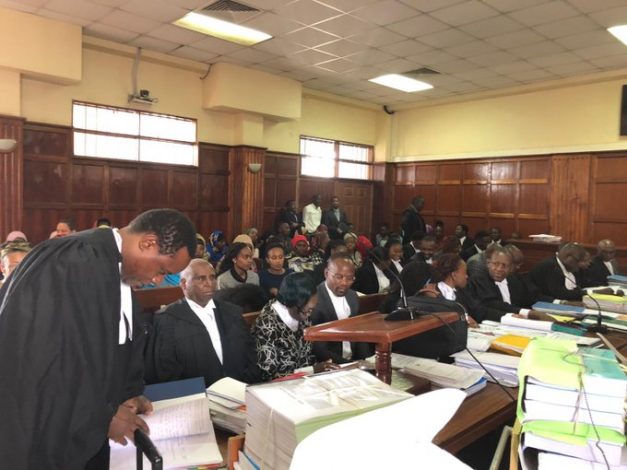The Kenyan High Court on Monday began hearing arguments centered on the National Integrated Information Management System (NIIMS) where the petitioners argue amendments made to the Registration of Persons Act pose serious and immediate threats to fundamental rights and freedoms protected under the Bill of Rights.
The NIIMS is intended to be a single repository of personal information of all Kenyans as well as foreigners resident in Kenya.
The petitioners in the case, The Nubian Rights Forum, the Kenya Human Rights Commission, and the Kenya National Commission on Human Rights argued that the changes made were a violation of the Constitution and in bad faith.
******
A perusal of the Petitions reveals the following key areas of contention:
a. The exclusion and discrimination against the Nubian community whom it is argued do not have national identity cards and/or birth certificates hence are disadvantaged by the uneven playing field as far as implementation of the NIIMS system is concerned;
b. The impugned amendments were introduced and passed without public consultation and /or public participation;
c. There are no adequate and/ or proper safeguards for protection of the data and/or personal information intended for collection under the NIIMS system, hence there is a violation and/or threat of violation of the right to privacy guaranteed under Article 31 of the Constitution;
d. The impugned amendments were published in an omnibus legislation and in a Gazette Notice that was crafted in such a manner as to conceal the amendments from the public. To wit, the impugned amendments were published alongside sixty seven other pieces of legislation, notwithstanding the substantive nature and seriousness of the impugned amendments. – Source (Nubian Rights Forum & 2 others v Attorney-General & 6 others; Child Welfare Society & 8 others(Interested Parties); Centre For Intellectual Property & InformationTechnology(Proposed Amicus Curiae)
*****
The respondents in the case are the Honourable Attorney General; the Cabinet Secretary, Ministry of Interior and Co-ordination of National Government; the Permanent Secretary, Ministry of Interior and Co-ordination of National Government; the Director of National Registration; the Cabinet Secretary for Information, Communication and Technology; the Speaker of the National Assembly, and the Kenya Law Reform Commission.
Yussuf Bashir, Advocate of the High Court on behalf of the petitioners in his opening statement argued that the government cannot rely on the law to fix technology; NIIMS system was designed to be exclusionary with no fixed purpose.
“NIIMS will create a digital citizen. This digital citizen is different than physical citizen. It will be used to determine who belongs, and who doesn’t,” he argued. “No one knows the challenges” of these systems more than communities like the Nubians.”
Grace Bomu, an associate at the Kenya ICT Action Network (KICTANet) and member of the Contract for the Web the first petitioner’s witness was cross-examined with a focus on the rights of children and the handling of children’s digital data as well as the application of other laws to NIIMS.
She argued that there should have been more special safeguards on the collection of children’s data and this should have been dealt with in advance. “Digitization is a harmful cultural practice and we adults are making choices on behalf of children who cannot undigitalize themselves once they are digitalized,” she told the court. ” There is no information in the public domain on NIIMS. All we know is what is in the amendment to the Registration of Persons Act.”
She was agreeable with the Government that it was necessary to collect children’s data when they are born and from what location. However, the information needed not to be in digital form. She argued that there was no law that talks about the collection of children’s data or issuing Identification Cards to them. “The Registration of Persons Act applies to citizens over the age of 18 years,” she told the court.
READ:
- Digital ID tech must be transparent if it is to work for citizens – ITWeb Africa
- Kenya Unveils Digital Economy Blueprint Anchored on Five Pillars
The Respondents witnesses will be before the court on Wednesday and Thursday.




